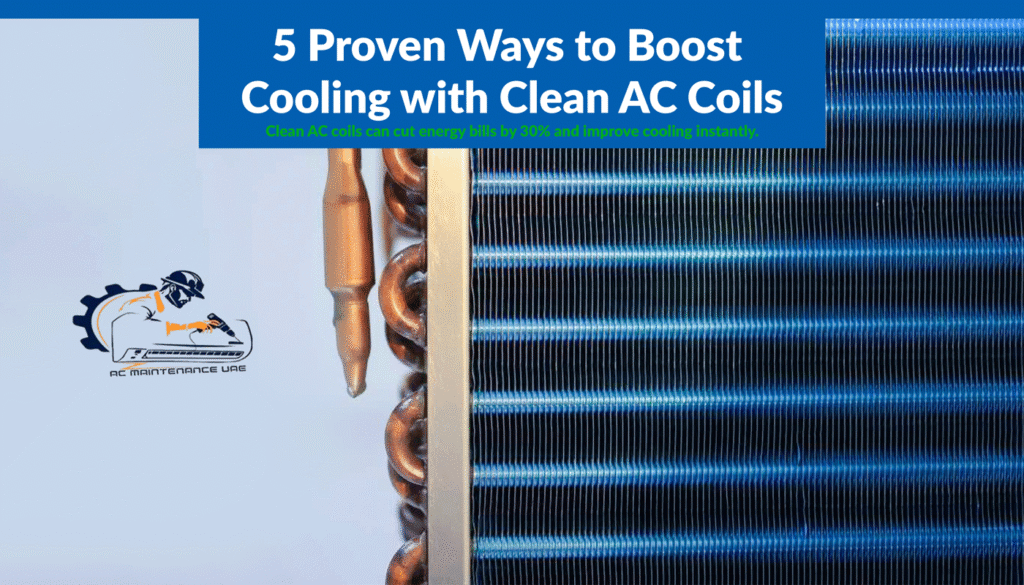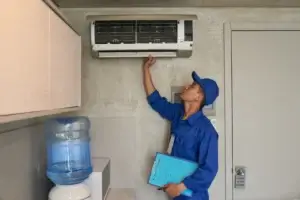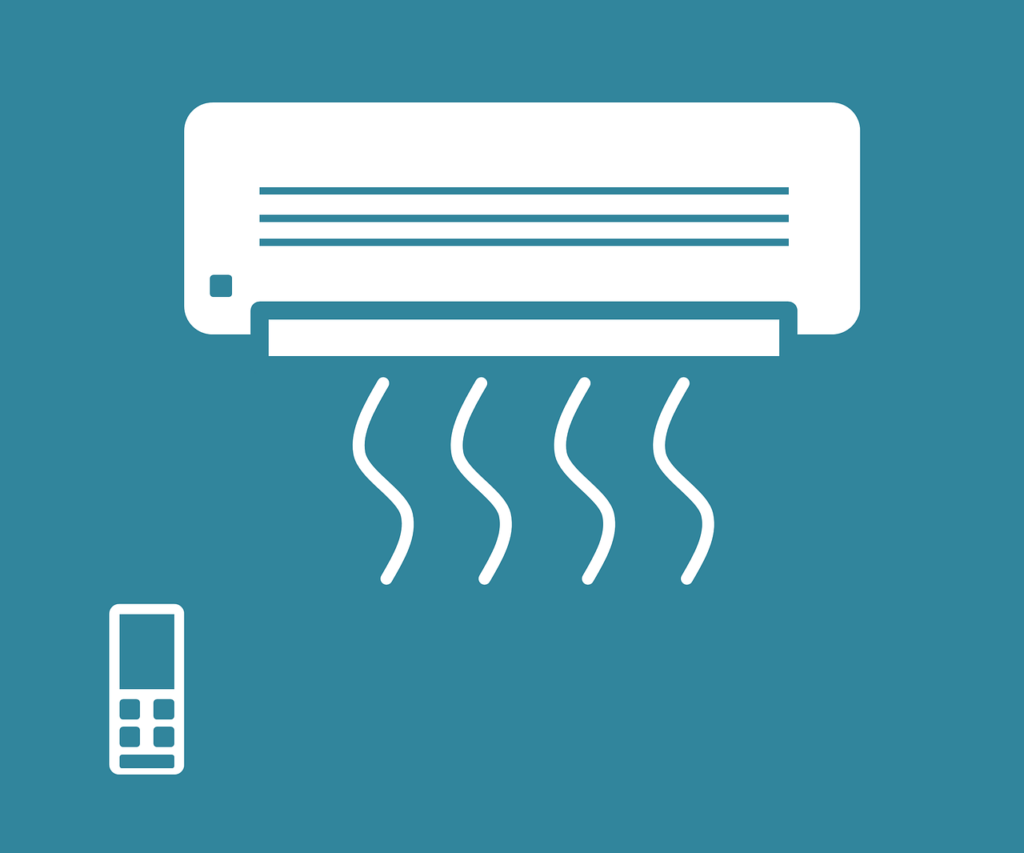Does your air conditioner have trouble cooling your house even when it is turned on all the time? The most common cause of skyrocketing energy bills and poor cooling performance is dirty AC coils.
This detailed manual will show you proven tips to clean AC coils successfully without compromising on the costs of maintenance, and save you the hassle of recovering the best efficiency, and save up to 30 percent on your monthly utility bills.
You will learn proven methods to economize hints and regular maintenance schedules, which will prolong the life of your system and service your home throughout the year.
What Is AC Coil Cleaning and Why Does It Matter
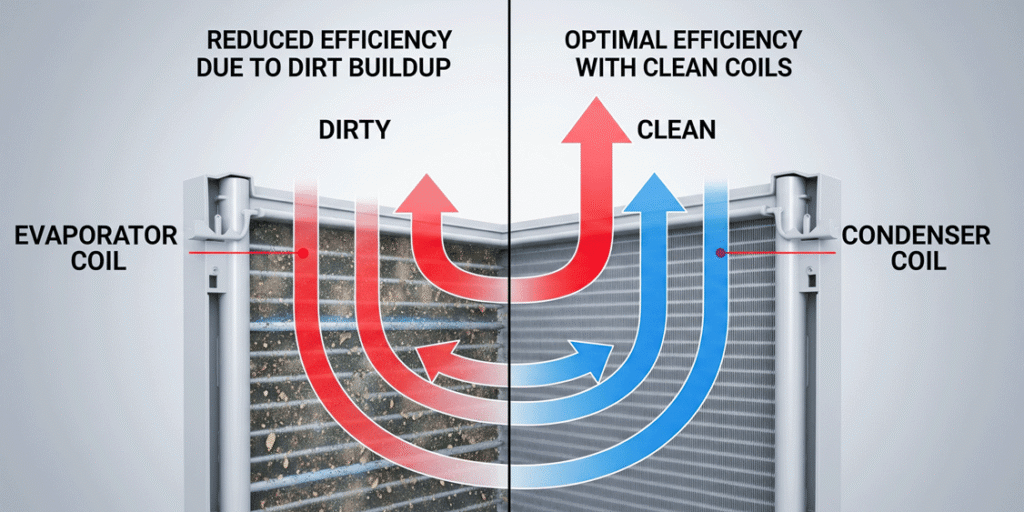
Air conditioner coil cleaning refers to the activity of getting rid of dirt, debris, and accumulation in the evaporator and condenser coils of your air conditioning system to get the optimum amount of heat transfer back. It is a necessary maintenance procedure that requires special techniques and equipment to remove the contaminants that build up over the years, which directly affect your system’s performance, energy use, and general longevity.
Understanding AC Coil Cleaning
AC coils are heat transfer elements that receive indoor heat (evaporator coils) and give it out (condenser coils). The formation of dirt and grime results in the development of barriers that slow down the process of heat transfer.
Clean AC coils provide maximum contact with the air to provide maximum heat exchange. Professional cleaning of HVAC coils involves professional equipment and solutions to remove the accumulation without destroying the sensitive coil fins.
Clean your AC coils at least once each season, and you can reduce your energy bill by up to 37 percent and increase cooling efficiency overnight.
Importance of Clean AC Coils for Energy Efficiency
There is a direct relationship between the performance and the energy consumption, and the use of clean AC coils.. Installing dirty coils causes your AC unit to work harder, using 37 percent more energy to produce the same cooling.
The topic of air conditioner efficiency tips always focuses on coil maintenance as the most economical solution to improve performance. Clean coils can be easily used to take on and give up heat, and thus, compressor strain is minimized, and equipment life is greatly enhanced.
Common Signs of Dirty AC Coils
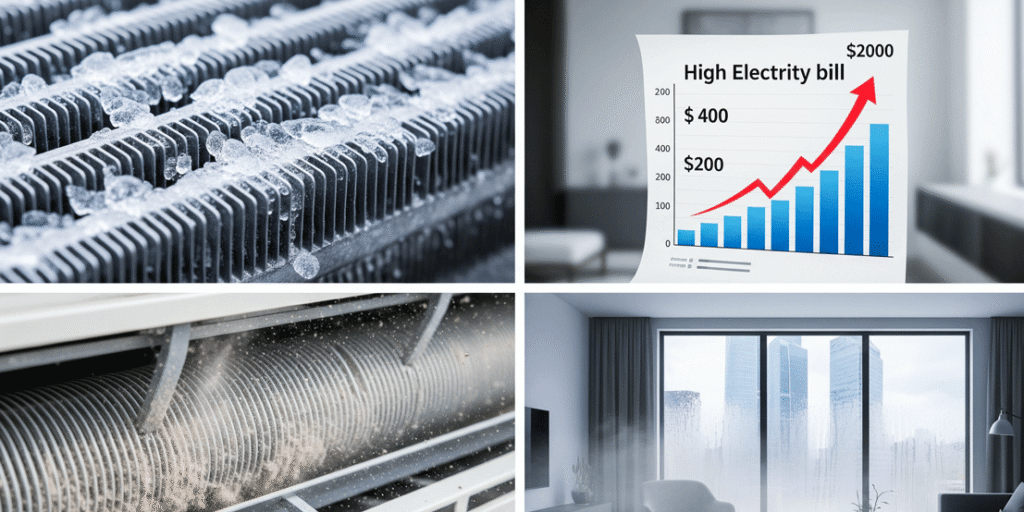
Early identification of dirty AC coils will avoid high expenses incurred during repairs and the waste of energy. Be on the watch for the following warning signs:
- Less cooling power and increased cooling time.
- Increased power costs regardless of usual use conditions.
- Freezing of the coils or refrigerant lines on the inside.
- Stuffy smells in the air vents.
- Difficulties in airflow and high levels of indoor humidity.
- Many systems are on and off cycling.
Such symptoms indicate that AC condenser coil cleaning or evaporator coil maintenance is a requirement to restore optimal performance.
Types of AC Coil Cleaning
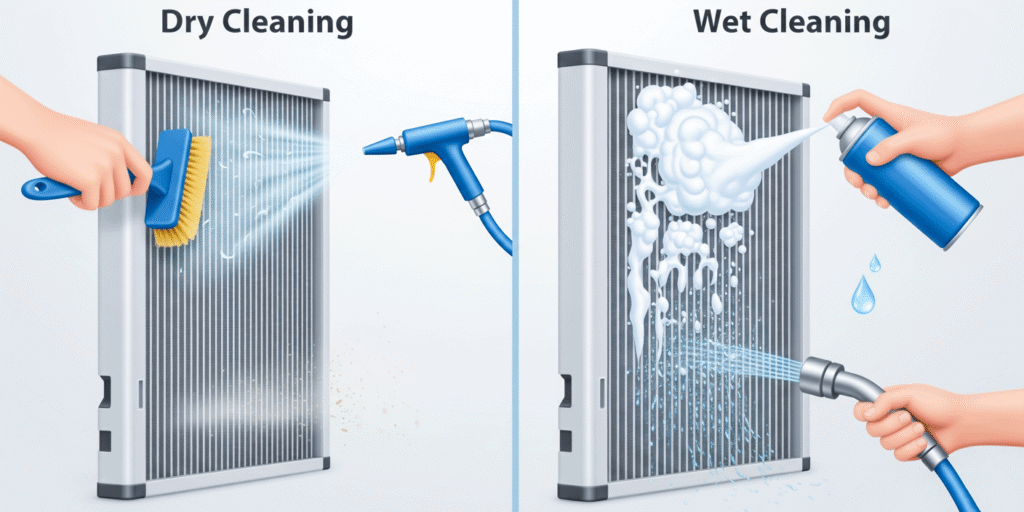
How to clean your system correctly will enable you to select the most appropriate cleaning process depending on the situation of your system and maintenance requirements of the same to generate the best results without damaging it.
Dry Cleaning Method
Dry cleanings include the use of compressed air, soft brushes, and vacuum tools to remove loosely laid debris on coil faces. This method is effective in the case of simple maintenance when contamination is not very high and coils are not covered with thick deposits.
Wet Cleaning Method
Wet cleaning is done using chemical solutions, foams, and water rinses to loosen the stubborn dirt and grease. Professional HVAC coil cleaning services frequently involve both approaches, which begin with dry cleaning and then move on to chemical cleaning to achieve overall cleaning results.
Wet cleaning is highly recommended at least once a year using a foaming solution due to the humid weather and regular dust storms.
Essential Coil Cleaning Tools You May Need
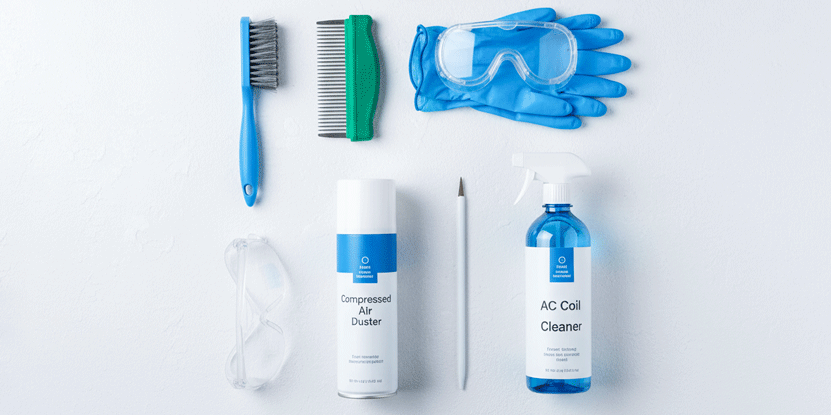
Simple DIY maintenance coil cleaning tools consist of:
- Lightly-bristled remover of soft debris.
- Fin, straightening curled coil fins.
- Blown out loose dirt cans of compressed air.
- Simple cleaning detergent solutions.
- Personal protective gear such as safety glasses and gloves.
Advance cleaning equipment includes foaming coil cleaners, no-rinse cleaning solutions, and high-protective UV coating. Quality tools will guarantee that the cleaning will be complete and no coils will suffer, and maintain the quality of cleaning, which will be more effective and time-saving in the long run.
Here are 5 Proven Methods to Boost Cooling with Clean AC Coils
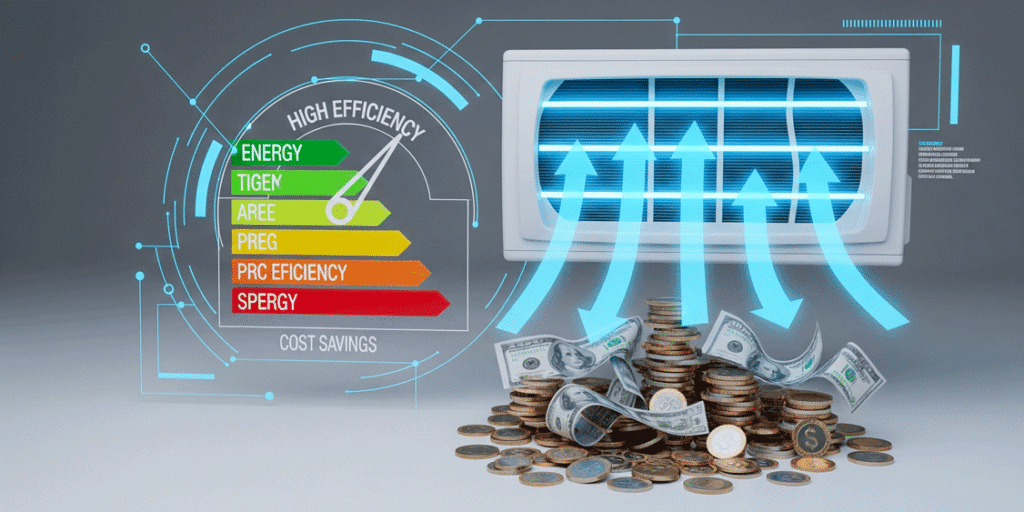
These thorough cleaning procedures are able to reclaim the efficiency of your AC system by as much as 37 per cent, save a lot of money in energy bills, and increase the lifespan of equipment through coil maintenance and care.
Deep-Cleaning Coils with Professional-Grade Chemicals
Professional quality cleaners dissolve mineral deposits and organic impurities that cannot be dissolved by ordinary detergents. These special solutions offer a deep cleaning, which goes under coil fins, killing away years of contamination. Their cleaning formula is based on EPA-approved formulations, as the HVAC coil cleaning services can deep clean and preserve coil material simultaneously, while providing long-term results without ruining equipment.
Using Foam or No-Rinse Coil Cleaners for Quick Maintenance
Foam cleaners swell up into coil holes, loosening dirt so that it can be removed easily without prolonged rinsing. No-rinse formulations dissolve contaminants, which are washed away naturally in the course of system operation. The solutions are also effective in evaporator coils in small areas with limited access to water, and they are effective at cleaning with low downtime.
High-Pressure Rinse for AC Condenser Coils
The advantage of AC condenser coil cleaning is that high-pressure water rinsing is under control, so that it can eliminate outdoor pollutants such as pollen and leaves. Correct pressure settings mean that coils will not be damaged during thorough cleaning. Inside-out directional rinsing will ensure that the debris does not move deeper in coil cavities to generate the best cleaning outcomes and the coils remain intact.
Anti-Microbial Treatment to Prevent Mold and Bacteria
Antimicrobial agents destroy molds and bacteria that grow in the wet coil environment. These are customized solutions to avoid biological growth that will create health problems and odors. Frequent usage generates protective layers against future contamination, thereby negating the cleaning frequency and offering longer coil cleanliness in favor of healthier indoor environments.
Scheduled HVAC Coil Cleaning Services for Year-Round Efficiency
The professional HVAC coil cleaning services have offered customized maintenance plans depending on the usage of your system and the environmental factors. Professional cleaning routinely will guarantee consistent performance and will avoid significant accumulations. Cleaning and inspections on a bi-annual basis are usually scheduled and ensure the maximum efficiency throughout the year with warranty cover and professional advice.
Foam cleaning should be applied frequently to ensure the best balance between cost and functionality, and professional chemical cleaning should be done at least once per 12-18 months.
Simple Steps on How to Clean AC Coils Safely
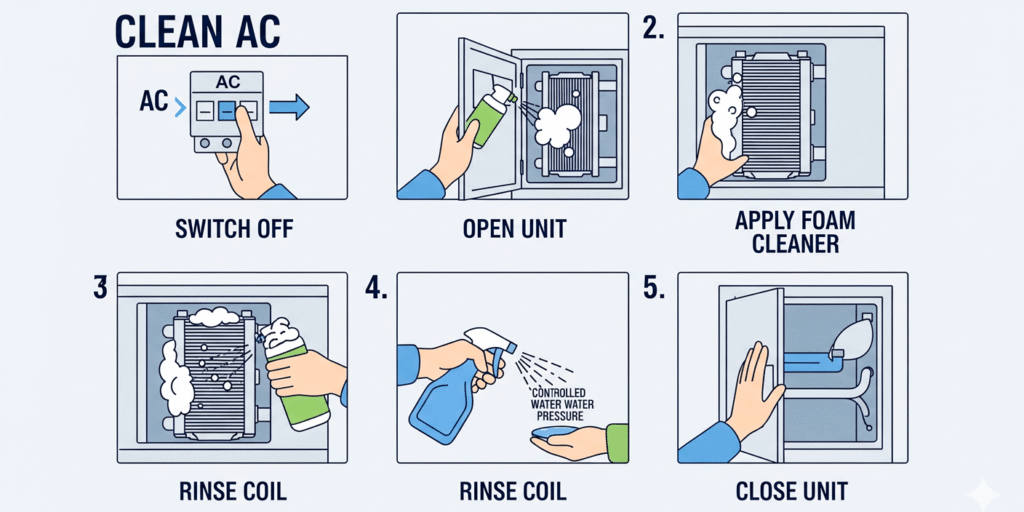
How to clean AC coils starts with the disconnection of the electrical disconnection and switching off the system to prevent accidents. Record the connection of wires, in addition to lifting out access panels and checking the condition of coils, before the onset of cleaning operations.
- Switch off the power both at the breaker and thermostat.
- Clean up the debris in and around the outdoor unit and access panels.
- Use the cleaning solution according to the instructions of its manufacturer.
- Wash with the correct pressure of water.
- Check up and reshape curved coil fins with fin combs.
- Install and reconnect the components and power.
Professional advice implements a safe cleaning method, and more so, for electric parts and refrigerant cavities. Poor methods may involve costly repair or loss of refrigerant or electrical hazards, which would be outweighed by cost savings in the cleaning.
The refrigerant may leak or cause electric shocks when it is not cleaned properly. In case of uncertainty, book a cleaning professional..
Common Mistakes to Avoid During Cleaning
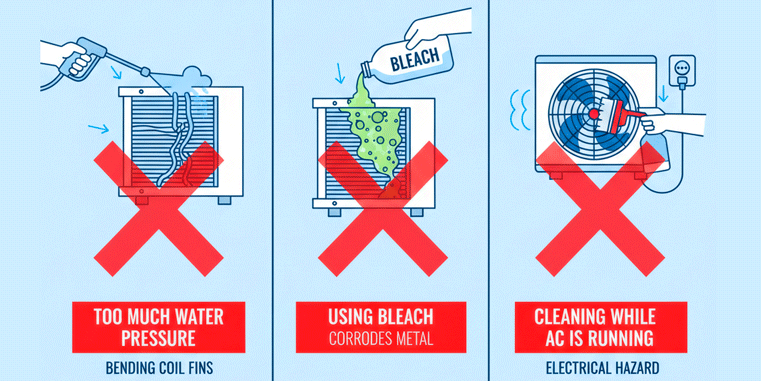
To prevent harm to your system or inefficiency in cleaning, avoid these errors that are crucial to avoid:
- Overpressure of water resulting in the bending of coil fins and reduction of airflow results in reduced efficiency..
- Using harsh chemicals or bleach, which is corrosive and breaks coil materials, resulting in refrigerant leakages and costly repairs.
- Cleansing during an operation that generates electricity risks and does not allow cleaning to be done.
- Drying before reassembly may entrap water and favor corrosion and biological development.
- Safe cleaning is with the help of professional advice, in the areas of electric parts and refrigerant piping, where an incorrect method may cost a fortune.
Cost and Frequency of AC Coil Cleaning
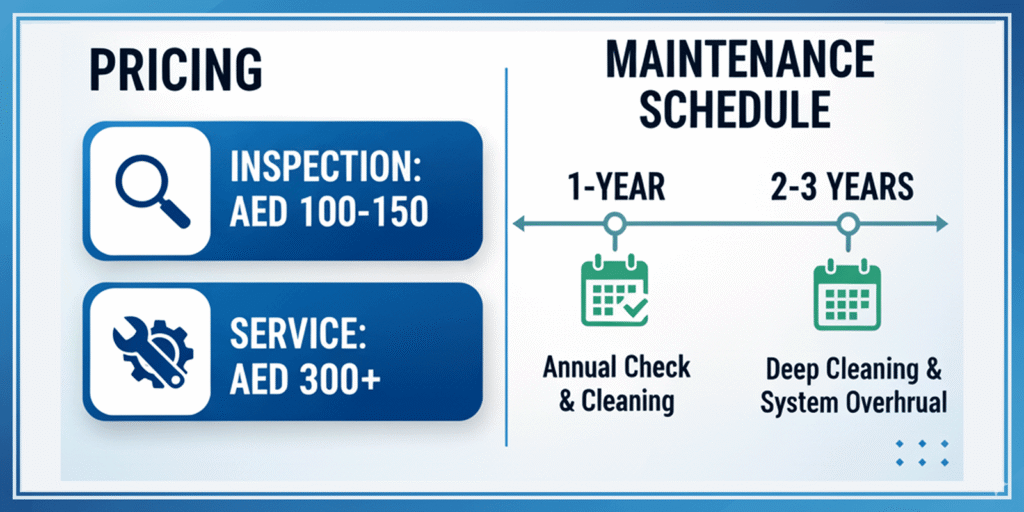
The cost of professional air conditioner coil cleaning consists of call-out and inspection fees that are generally 100-150 AED. Major service cost begins with 300 AED, and it will depend on the parts, brand, and capacity demand. HVAC coils cleaning services usually have package offers of full maintenance.
Cleaning of AC condenser coils and evaporator coils should be done after every 1 and 2-3 years, respectively. Professional services are guaranteed to provide a comprehensive outcome with warranties.
FAQs
Q1. How often should I clean my AC coils?
Annual cleaning of the AC condenser coils is necessary, and evaporator coils must be cleaned every 2-3 years.
Q2. Can I clean AC coils myself?
Yes, but with the correct coil cleaning equipment and safety measures, HVAC coil cleaning services will guarantee more successful outcomes.
Q3. What happens if I don’t clean my AC coils?
Soiled AC coils lower efficiencies to as much as 37 percent and raise energy expenses dramatically.
Q4. How much does professional coil cleaning cost?
Coil cleaning of professional air conditioners costs between AED 370 and 1100 based on the size of the system.
Q5. What tools do I need to clean AC coils?
Soft brushes, fin combs, compressed air, and mild cleaners are the necessary coil cleaning tools.
Conclusion:
The best method of optimizing your system to minimize energy costs, as well as maintain your system at its best, is to maintain clean AC coils. We at AC Maintenance UAE are trusted professionals, and we know the harsh climate conditions of the UAE and offer the best coil cleaning options that will ensure the best efficiency and life of the system. Maintenance avoids expensive repairs and also guarantees a high level of cooling comfort even during the summer.
The thorough results of professional air conditioner coil cleaning and the proper DIY maintenance make your system efficient in between professional visits. So, now you understand how to keep your AC coils clean and in good condition, so you can book your professional coil cleaning appointment, save a bunch of money on your power bills, and have a fully functional cooling system all season long!
AC Maintenance UAE Team
Welcome to AC Maintenance UAE, your reliable partner for complete air conditioning repair and maintenance services in Dubai, Sharjah, and Abu Dhabi. We are strongly dedicated to excellence and deliver efficient and reliable services to keep your cooling systems performing at their best.
- AC Maintenance UAE Team
- AC Maintenance UAE Team
- AC Maintenance UAE Team
- AC Maintenance UAE Team

